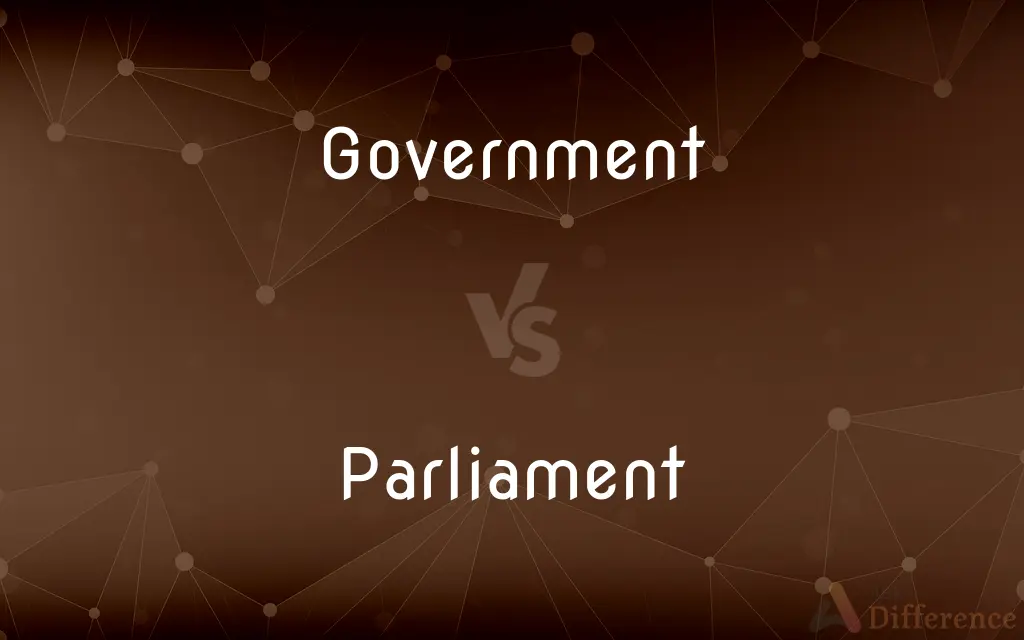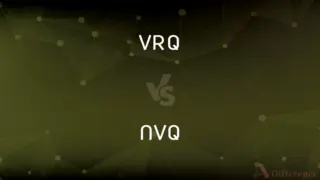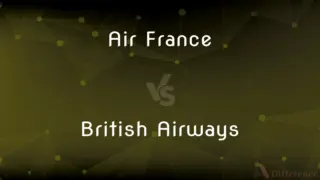Government vs. Parliament — What's the Difference?
By Maham Liaqat & Urooj Arif — Published on March 7, 2024
Government executes laws and policies, focusing on daily administration, while Parliament creates laws and oversees the government, emphasizing legislation and scrutiny.

Difference Between Government and Parliament
Table of Contents
ADVERTISEMENT
Key Differences
A government is responsible for the daily administration and execution of state policies, decisions, and affairs. It is headed by elected officials who manage various departments and agencies. On the other hand, a parliament is a legislative body that creates laws, debates national issues, and scrutinizes the government's work, ensuring accountability and transparency in its operations.
Governments are formed by political parties or coalitions that hold a majority in the parliament or through appointments in presidential systems. They implement laws, provide public services, and conduct foreign relations. Whereas parliaments consist of elected representatives who legislate, amend laws, and have the power to approve or reject proposals, including budgets and policies proposed by the government.
The structure of governments can vary widely, ranging from single-party systems to complex coalitions, and they operate under the framework of the constitution. Parliaments, while also diverse in structure, typically operate in bicameral or unicameral systems, representing the electorate and regions within a country.
Governments are accountable to the parliament, which can exercise oversight through questions, debates, and inquiries. This ensures that the government's actions align with the law and public interest. On the other hand, parliament's effectiveness in holding the government to account can significantly influence political stability and public trust.
Both the government and parliament play critical roles within a democratic system, working together yet serving distinct functions. The government executes policies and administers public services, while the parliament enacts legislation and oversees government actions to ensure they meet legal and ethical standards.
ADVERTISEMENT
Comparison Chart
Primary Function
Executes laws and manages daily affairs
Creates laws and oversees the government
Composition
Elected officials and appointed members
Elected representatives
Accountability
To the parliament and electorate
To the electorate
Role in Legislation
Implements and enforces laws
Drafts, debates, and passes laws
Oversight
Subject to parliamentary scrutiny
Conducts scrutiny of the government's work
Compare with Definitions
Government
Executes and administers state policies.
The government introduced a new public health policy.
Parliament
Legislative body that makes laws.
The parliament passed a new environmental protection law.
Government
Formed by the ruling party or coalition.
The current government is a coalition of two major parties.
Parliament
Consists of elected representatives.
Members of parliament were elected in the recent general election.
Government
Manages foreign relations.
The government negotiated a new trade agreement.
Parliament
Debates national issues.
Parliament held a debate on national security today.
Government
Responsible for public services.
The government launched a nationwide infrastructure program.
Parliament
Approves the national budget.
The parliament approved the annual budget after extensive discussions.
Government
Accountable to the parliament.
The government must report its spending to parliament.
Parliament
Oversees the government.
Parliament conducts hearings to scrutinize government actions.
Government
The act or process of governing, especially the control and administration of public policy in a political unit.
Parliament
A representative body having supreme legislative powers within a state or multinational organization.
Government
Exercise of authority in a political unit; rule.
Parliament
Parliament The national legislature of the United Kingdom, made up of the House of Lords and the House of Commons.
Government
The agency or apparatus through which a governing individual or body functions and exercises authority.
Parliament
In many countries, the legislative branch of government, a deliberative assembly or set of assemblies whose elected or appointed members meet to debate the major political issues of the day, make, amend, and repeal laws, authorize the executive branch of government to spend money, and in some cases exercise judicial powers; a legislature.
Government
The ruling political party or coalition of political parties in a parliamentary system.
Parliament
A particular assembly of the members of such a legislature, as convened for a specific purpose or period of time (commonly designated with an ordinal number – for example, first parliament or 12th parliament – or a descriptive adjective – for example, Long Parliament, Short Parliament and Rump Parliament).
Following the general election, Jane Doe took her oath of office as a member of the nation's fifth parliament.
Government
The body with the power to make and/or enforce laws to control a country, land area, people or organization.
British government has historically centred exclusively on London.
Parliament
The assembly of the three estates of the United Kingdom of Great Britain and Ireland, viz., the lords spiritual, lords temporal, and the representatives of the commons, sitting in the House of Lords and the House of Commons, constituting the legislature, when summoned by the royal authority to consult on the affairs of the nation, and to enact and repeal laws.
Government
The state and its administration viewed as the ruling political power.
If the citizens must follow the law, then the government must follow the constitution.
Parliament
A legislative assembly in certain countries (e.g., Great Britain)
Government
The act of governing; the exercise of authority; the administration of laws; control; direction; regulation; as, civil, church, or family government.
Government
The mode of governing; the system of polity in a state; the established form of law.
That free government which we have so dearly purchased, free commonwealth.
Government
The organization that is the governing authority of a political unit;
The government reduced taxes
The matter was referred to higher authorities
Government
(government) the system or form by which a community or other political unit is governed;
Tyrannical government
Government
The study of government of states and other political units
Common Curiosities
Can the parliament dismiss the government?
In many democratic systems, the parliament has the power to dismiss the government through a vote of no confidence.
What is the main difference between government and parliament?
The government administers and executes policies, while the parliament creates laws and oversees the government.
How are members of the government and parliament chosen?
Government officials are often elected members of parliament or appointed, while parliamentarians are directly elected by the public.
How does a government form?
A government is formed by the party or coalition with a majority in parliament or through presidential appointments, depending on the system.
Do all countries have both a government and a parliament?
Most democratic countries have both, but their structures and powers can vary significantly.
What is the role of the opposition in the parliament?
The opposition critiques the government's policies, proposes alternatives, and ensures accountability.
What role does the parliament play in legislation?
The parliament drafts, debates, and passes laws, including amendments to existing legislation.
What happens if a government loses parliament's support?
If a government loses the support of the parliament, it may have to resign, leading to the formation of a new government or elections.
What checks and balances exist between government and parliament?
Parliaments check the government through scrutiny, debates, and votes, while governments must navigate parliamentary approval to enact policies.
How does the public influence government and parliament?
The public elects members of parliament, who in turn hold the government accountable, reflecting the electorate's will.
Can the government influence parliament?
Governments can influence parliament through policy proposals, lobbying, and the party's legislative agenda.
How do governments and parliaments interact?
Governments propose legislation and policies, which parliaments then review, amend, and approve or reject.
What is the significance of parliamentary committees?
Committees scrutinize specific areas of government policy and legislation, playing a key role in detailed examination and oversight.
Are there any systems without a separate government and parliament?
Some systems, like direct democracies or absolute monarchies, may not have a separate or traditional parliamentary structure.
How does the parliamentary system differ from the presidential system?
In parliamentary systems, the government is typically drawn from the parliament, while in presidential systems, the executive is separate from the legislature.
Share Your Discovery

Previous Comparison
VRQ vs. NVQ
Next Comparison
Air France vs. British AirwaysAuthor Spotlight
Written by
Maham LiaqatCo-written by
Urooj ArifUrooj is a skilled content writer at Ask Difference, known for her exceptional ability to simplify complex topics into engaging and informative content. With a passion for research and a flair for clear, concise writing, she consistently delivers articles that resonate with our diverse audience.












































